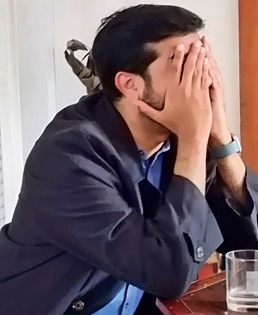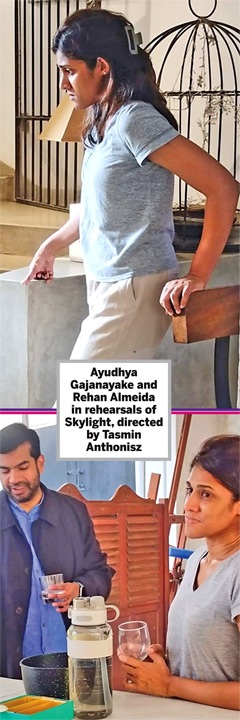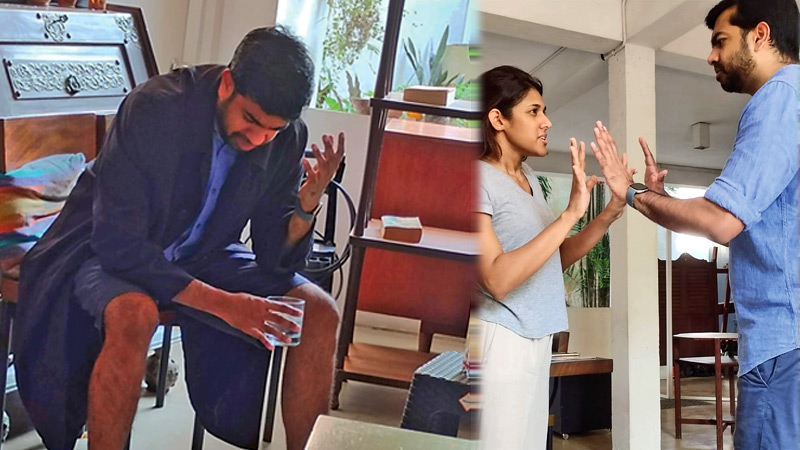 In this week’s Youth Observer cover story, we took a close look at the fascinating journey of Tasnim Anthonisz in Sri Lanka’s theatre scene, to discover more about her upcoming production ‘Skylight’ by David Hare.
In this week’s Youth Observer cover story, we took a close look at the fascinating journey of Tasnim Anthonisz in Sri Lanka’s theatre scene, to discover more about her upcoming production ‘Skylight’ by David Hare.

Tasnim Anthonisz
Tasnim, also known as Taz, graduated in Drama and Screen Studies from Manchester University. Her journey in theatre began at an early age, marked by her captivating portrayal as a Munchkin in The Wendy Whatmore Academy production of “The Wiz.”
Her recent directorial venture, “Skylight,” a poignant play by David Hare, will be staged from April 4th to 7th, at 7 pm at the Namel Malini Punchi Theatre in Borella. In the exclusive interview with Tasnim, she shed light on her creative process, the thematic resonance of “Skylight” in contemporary Sri Lankan society, and the challenges she encountered in bringing this compelling production to life.
Q: What drew you to David Hare’s Skylight as a play to bring to Colombo?
A: I was reminded of the play last year, having read it for the first time about 10 years ago. It struck me how relatable it is to life in Sri Lanka now, even though it was written and is set in London in ‘96. The story and the characters would be very familiar to many people, and one can identify with much of what is said from both the principal characters’ viewpoints.
 I’m sure most people above a certain age have found themselves in situations where they’ve had to burn a bridge or two (metaphorically speaking) because that connection just clearly does not align with their own principles. I think the beauty of the script, though, is how it conveys such poignancy while keeping the language light and easy. It has this undercurrent of deeper feeling beneath the wit and banter that strikes you in the most unexpected ways.
I’m sure most people above a certain age have found themselves in situations where they’ve had to burn a bridge or two (metaphorically speaking) because that connection just clearly does not align with their own principles. I think the beauty of the script, though, is how it conveys such poignancy while keeping the language light and easy. It has this undercurrent of deeper feeling beneath the wit and banter that strikes you in the most unexpected ways.
Q: How do you think the themes of Skylight resonate with the current socio-economic climate and the complexities of human relationships in contemporary Sri Lankan society?
A: There’s this line in the play: “It’s out of date. Relationships. Permanence. All that stuff’s finished,” which pretty much sums up how fluid and nuanced our social landscape can be due to the changeable nature of human beings. That’s life.
Although it’s said in reference to dating, it applies to our interactions across the board. One day you’re good with someone, and then mid-conversation, they or you might say something that accidentally or intentionally triggers the other person.
Most people tend not to communicate their triggers. In Skylight, there’s a lot that goes unsaid, a lot of reading between the lines. But there’s also an understanding of what’s not said, and it’s about recognizing that. A major contributing factor to the tension between Kyra and Tom is their respective ideas of what success is and what pursuits are worth spending one’s life on. I think that debate is something many of us can engage with in our present climate.
Q: How do you navigate the complexities of portraying class dynamics and societal issues on stage?
A: The play presents a strange juxtaposition of the super elite and the lower middle class (for London), by placing three characters who come from privilege in the most uncomfortable environment possible. We’re presented with three different opinions of life in the lower-middle rung.
In a way, it seems almost hypocritical because you’re looking for the authentic lower-middle voice, and it seems to be missing. But in the process of building up the characters, their backstory, and mindset, you realize it’s there in the way these people choose to navigate through their economic landscape at various points in time.
It’s an interesting contrast because you have basically a billionaire with a scarcity mindset, a trust-fund hot dog seller, and a maths teacher with nothing who thinks in abundance.
Q: What do you think audiences will take away from experiencing Skylight?
 A: Closure. That’s what the play is at its heart, and we can only hope to provide you with that satisfaction. Apart from that, I really can’t say. It will be interesting to see how people respond.
A: Closure. That’s what the play is at its heart, and we can only hope to provide you with that satisfaction. Apart from that, I really can’t say. It will be interesting to see how people respond.
Q: As the director, what unique perspective or interpretation are you bringing to this production?
A: We’re aiming for realism, as much as possible. The entire play unfolds in this woman’s apartment over the course of 24 hours. So our focus is on creating the immediacy of the present moment. But one of the things I love about this play is the way it traverses through time to develop the romantic history between the characters, and at those points, realism becomes a little surreal.
Q: Could you share some insights into the casting process for Skylight and what you were looking for in your actors?
A: I was fortunate to have Ayudhya, Rehan, and Akmal join the cast. For a three-player play like this, it’s crucial to have a cast of strong performers who can keep the audience engrossed for two hours. I also wanted actors who were age-appropriate and could bring their own creative input into the rehearsal process.
Ayudhya, Rehan, and Akmal excel in both respects. They make my job extremely easy because it’s a joy to watch them work, and they have a lot of fun in the process too.
Q: Skylight has been described as both comical and deeply sincere. How do you balance these different tones in your direction?
A: In true British style, it’s underplayed and deadpan. But in all seriousness, the script doesn’t require us to emphasize the humour. The sincerity of the emotion and history is far more important to the storytelling. That’s also the more challenging aspect.
There are already times when I’m watching Rehan and Ayudhya perform, and I’m getting emotional. I don’t usually get emotional as a spectator. Personally, I can’t wait to see them perform it on stage.
Q: What challenges have you encountered in bringing Skylight to the stage, and how did you overcome them?
A: Mainly the realism in the set. The script itself asks for a lot of practicals that actually have to work. Like the means to make spaghetti on stage. Also, because it’s in one setting, and at all times there’s only max of two people on stage, we really have to get inventive about the way we use the space so it keeps simmering.
Q: How do you see theatre as a platform for sparking dialogue and social change, particularly in the context of Skylight?
A: Skylight serves as a depiction of two individuals from contrasting socio-political backgrounds aiding each other in self-discovery, which forms the basis of their 12-hour conversation (or, in reality, two hours). However, their downfall lies in their inability to fully embrace each other’s perspectives alongside their own.
Reflecting the real world, we can hope for a similar level of effort, at least in attempting to understand those different from ourselves, albeit in an idealistic sense. What audiences are likely to discuss afterward is the relationship between Kyra and Tom and the depth of their emotions for each other. On the journey home, someone may even remark, “Ah, that line rings true, doesn’t it? We’ve experienced that too.”
Q: What advice would you give to aspiring theatre directors or producers who wish to tackle socially relevant topics in their work?
A: It’s easy to pick a play that’s “socially relevant” and do it. But to do it well it has to mean something more to you, on a personal level. If you have a cause you’re passionate about, something you need to share publicly, that eats at you until you express it or at least acknowledge it out loud, you’re on the right track.
Q: Finally, what are your future aspirations for Studiolusion, and how do you see it evolving in the years to come?
A: I’m cautious about answering these questions now given the context of the past four years. But we’re getting back on track, and hopefully we will continue to produce and develop performance work that theatre goers can take away and hold something of long after the lights go down.






